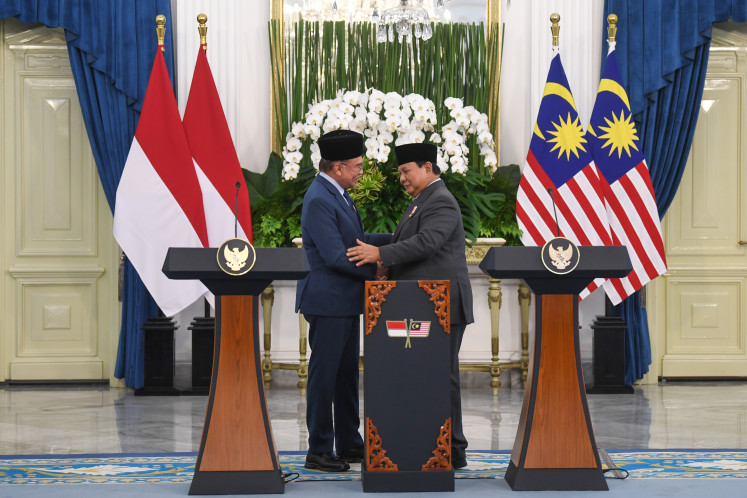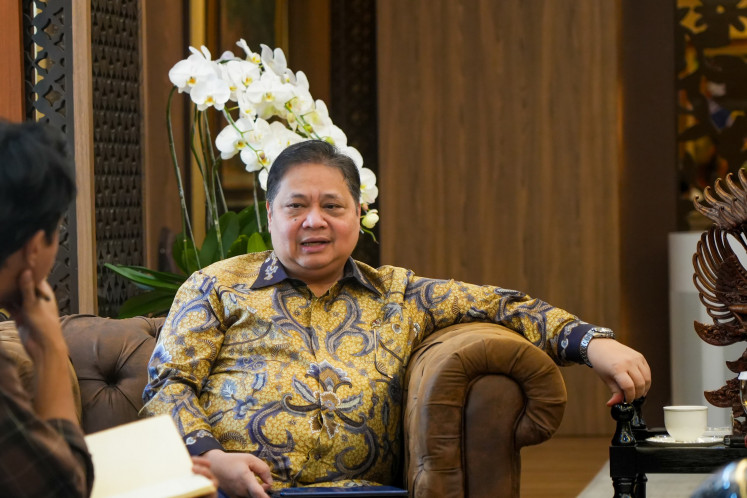Popular Reads
Top Results
Can't find what you're looking for?
View all search resultsPopular Reads
Top Results
Can't find what you're looking for?
View all search resultsOpen government key to spur development
Leaders talk: Vice President Jusuf Kalla (second right) shakes hands with Deputy Foreign Minister AM Fachir (left) during the opening of the Asia Pacific Leaders Forum on Open Government 2017 in Jakarta on Thursday
Change text size
Gift Premium Articles
to Anyone
L
span class="caption">Leaders talk: Vice President Jusuf Kalla (second right) shakes hands with Deputy Foreign Minister AM Fachir (left) during the opening of the Asia Pacific Leaders Forum on Open Government 2017 in Jakarta on Thursday. Also in the picture are National Development Planning Minister Bambang Brodjonegoro (second left) and Afghanistan’s Second Vice President Mohammad Sarwar Danesh. Around 500 representatives from 14 countries attended the event.(JP/Wendra Ajistyatama)
Bojonegoro residents in East Java regularly come to the regency office to have a dialogue with Regent Suyoto Ngartep Mustajab and his officials. In the meetings, broadcast on local radio, the public can share their complaints to regency officials, who then use them as ideas for development.
Since taking office in 2008, Suyoto has implemented open-government initiatives, ranging from accepting complaints through Facebook to online submissions, in order to ensure public participation in the decision-making process.
“The essence of the partnership is how [the government and the people] look at the problems together, seek solutions together and distribute the solutions together,” said Suyoto, who is serving his second term.
Suyoto’s responsive and transparent efforts helped boost economic growth in the regency. It won recognition, along with Paris, France, and Madrid, Spain, in 2016 from the Open Government Partnership, a multilateral initiative to promote open government. The regency was recognized as one of the world’s top 15 subnational governments with pilot programs aimed at improving open governance.
Open government, which highlights transparency and good governance, was a means to achieve the UN Sustainable Development Goals (SDG), which also emphasized collaborations with civil society groups, said National Development Planning Board (Bappenas) Minister Bambang Brodjonegoro.
“One of the goals of the SDGs is to reduce inequality. But the government cannot do it alone; we are not able to reduce inequality without coordination and support from local government,” he said on Thursday in Jakarta during the opening plenary of the 2017 Asia Pacific Leaders Forum (APLF) on Open Government.
He strongly urged local governments to realize the importance of open government as “they need to be transparent and more communicative so the local citizens know what the [local] governments do.”
Local government leaders from the Asia-Pacific region were among the participants who attended this year’s APLF, a one-day event hosted by Indonesia, during which hundreds of countries’ representatives, civil society groups and development partners gathered to share their experience and solutions to advance open government.
The forum, spearheaded by the national secretariat of Open Government Indonesia (OGI), adopted the theme of “Open Government for Inclusive Development.” It focused on the issues that present challenges to development in the Asia-Pacific region and concluded that open government was key to addressing the issue.
Another example came from Edgar Chatto, the governor of Bohol, the Philippines, who asserted the need for engaging civil society groups and providing transparency during the budgeting process at the legislative level. Bohol, which has won the title of the most business-friendly province in the Philippines, also had online systems for the public to access details regarding project implementation and budget utilization.
Bernadia Irawati Tjandradewi, the secretary-general of United Cities and Local Governments Asia-Pacific (UCLG ASPAC), said the achievement for 65 percent of the targets in the SDGs was related to the efforts of local actions and actors; therefore, a strong role from local governments was important.
“We can imagine if more than half of local governments in Indonesia had an open government, I believe that our anticorruption index would improve. Everything starts at the local level,” she added.
Vice President Jusuf Kalla, who delivered the keynote speech at the opening of the event, said the Indonesian government remained committed to improving its transparency, as mandated by the 2008 law on public information. Open government also held an important role to improve citizens’ trust in the government.
“Transparency, accountability and short bureaucracy support the efforts to eradicate corruption [and] manipulation, which in turn will push for more quality development,” Kalla said.
Meanwhile, Hamong Santono, from the International NGO Forum on Indonesian Development (INFID), said he hoped the success story of Bojonegoro would inspire other local administrations to follow and implement the principles of open government.
Still, the central government also needed to show greater political commitment toward the practice, including by issuing more laws related to open government.
“The challenge for Indonesia in the OGP is how to make the issue reach the grassroots level, and the way to do that is to create other [places like] Bojonegoro in the country,” Hamong told The Jakarta Post.










